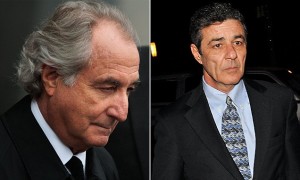The greater tragedy of King Lear was his utter isolation and alone-ness in the world. In the end, he had nothing. Fame and fortune had escaped him and in the end, as he awaited his fate, he would come to realize where his choices had led him. Make no mistake, Lear is an ethical tale and it stands, and will stand, the test of time.
As Bernie Madoff sits in his jail cell he can now read of the death of his former aide, Frank DiPascali. No, Madoff did not cause DiPascali’s death from lung cancer, but it seems that everything and everyone that Madoff came near died in spirit and in health.
The Wall Street Journal (May 11, 2015), ran an article entitled: “Former Madoff Aide Frank DiPascali Dies at Age 58 of Lung Cancer – Former CFO of Bernard L. Madoff’s firm had been awaiting sentencing for 10 criminal charges.”
Stephanie Yang, the writer of the piece stated:
“At the time of his death, Mr. DiPascali, 58, was awaiting sentencing for 10 criminal charges. He faced a maximum of 125 years in prison, but had hoped his cooperation in testifying against former colleagues at the New York investment firm would lead to a lighter sentence.
‘He was grateful to have been able to make some amends by helping the government these past few years,’ Mr. Mukasey said in his statement.”
DiPascali did plead guilty to running a scam that would eventually steal about $17 billion from investors. Some of these investors were wealth “high rollers,” corporations and academic institutions, to be sure however, a great many were just everyday working people who lost everything they ever saved. If you would, care to imagine if you had placed all of your life’s savings with Madoff’s firm and lost everything.
In the article, Yang writes: “Mr. DiPascali said he was unaware of any financial fraud for several years after he joined Mr. Madoff. He rose through the ranks to become chief financial officer in 33 years at the firm.”
When did he know?
Thirty-three years is a very long time for anyone to be associated with a company. I am sure, perhaps at the very beginning, that DiPascali was simply a person who wanted to build a career. Wall Street is known for its excesses and successes and I would imagine that as Madoff’s aide grew in stature and power, he had plenty of both.
As I sit at my desk and write this, I wonder at what time in his career at Madoff Investments, DiPascali discovered an ethical crossroads. At what point did he go from staring at ledgers and rudimentary computers to full-blown reporting systems, finally realizing that something was just-not-right?
DiPascali was being groomed those many years. He began to make choices along-side of Bernie Madoff. He had the opportunity to leave at some point, suspecting; yet, he chose to stay. It rather blows a theory out of the water. We can view Madoff as an awful lone wolf; an ethical jackal without scruples or mercy, but we must also consider that there were those around him who rode on the lone-wolf’s back. Madoff did not act alone; he did not commit fraud in a vacuum. There were others who were every bit as greedy and self-centered.
With regrets, of course
I am saddened for DiPascali’s family. There must have been a point where the depth of his involvement in Madoff’s scam came to light; when his friends and family saw the tragic enormity of his actions. Where it was realized that the pleasures and perks of his lifestyle had been made on the backs of suckers. Then, to know that his lung cancer would end his life, was the second tragic blow.
Yes, it is a good thing that he cooperated with authorities. Maybe it helped some of the defrauded investors to recover a small fraction of their money; maybe it gave him a sense of peace at the end of his life. Both of those things are good and I hope his family and friends take some comfort in that.
In some ways, DiPascali might be even more tragic than Bernard Madoff. He saw clear-cut choices perhaps 10, 20 or more years ago. He favored opportunity to commit fraud ahead of good choices.
Sadly, and I hate to say this, there may be someone reading this blog, or someone who knows of someone, who may be at the very same ethical crossroads of DiPascali many years ago. I talk on ethics throughout the country, and I too made some bad mistakes that I was able to correct before it was too late.
King Lear could not win; not in the 1600s when Shakespeare wrote of him and not now, no matter the profession or form he or she might take. Bad choices lead to bad consequences. It is an ethical certainty.



